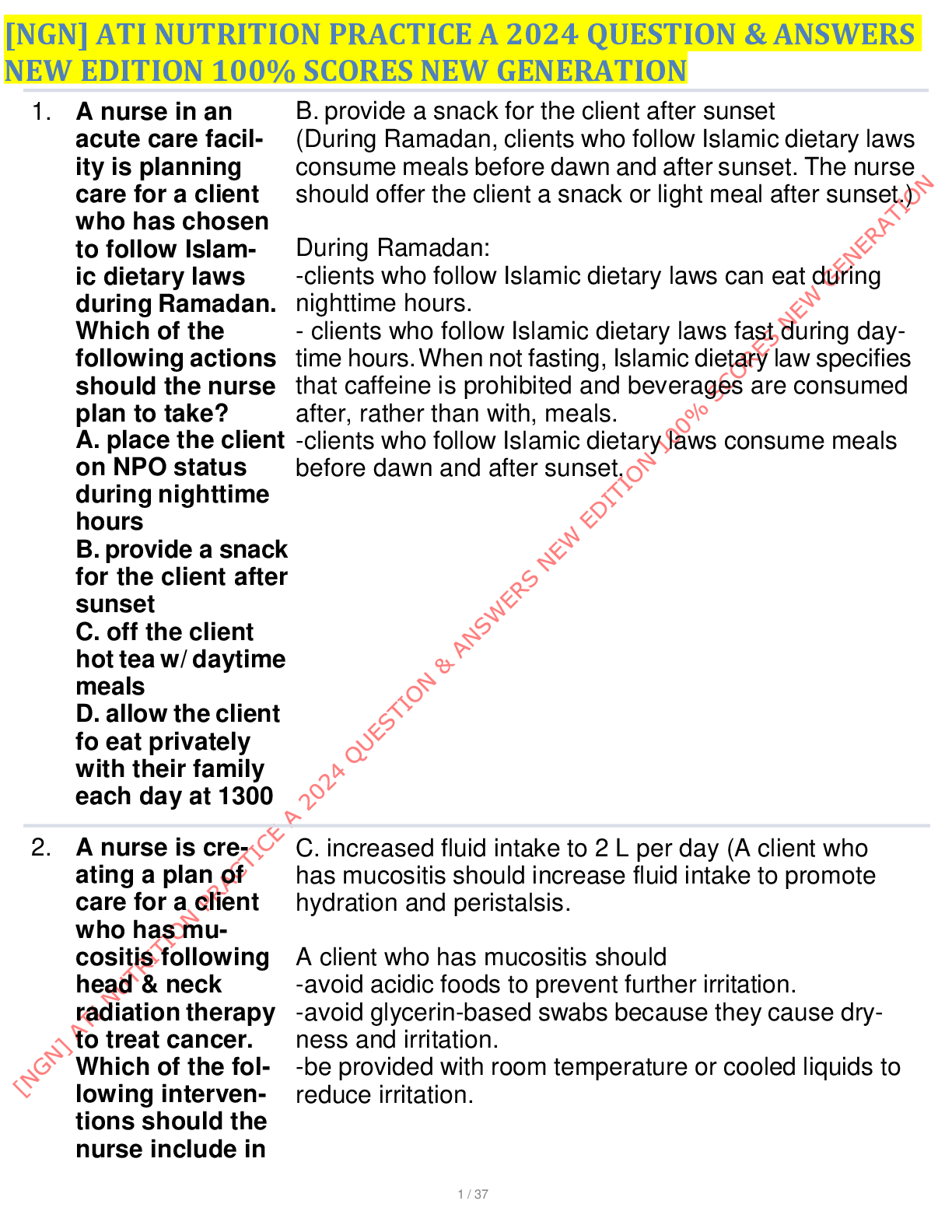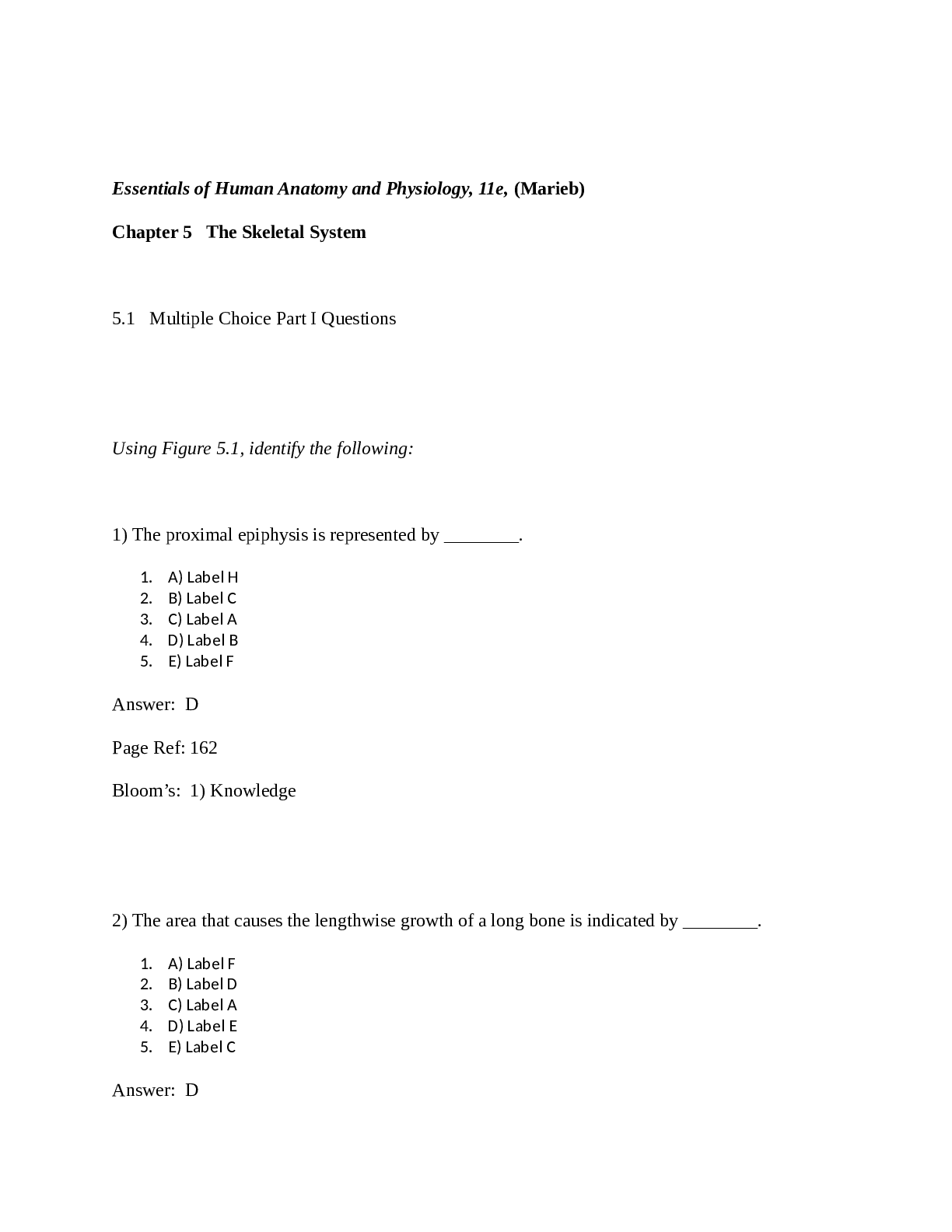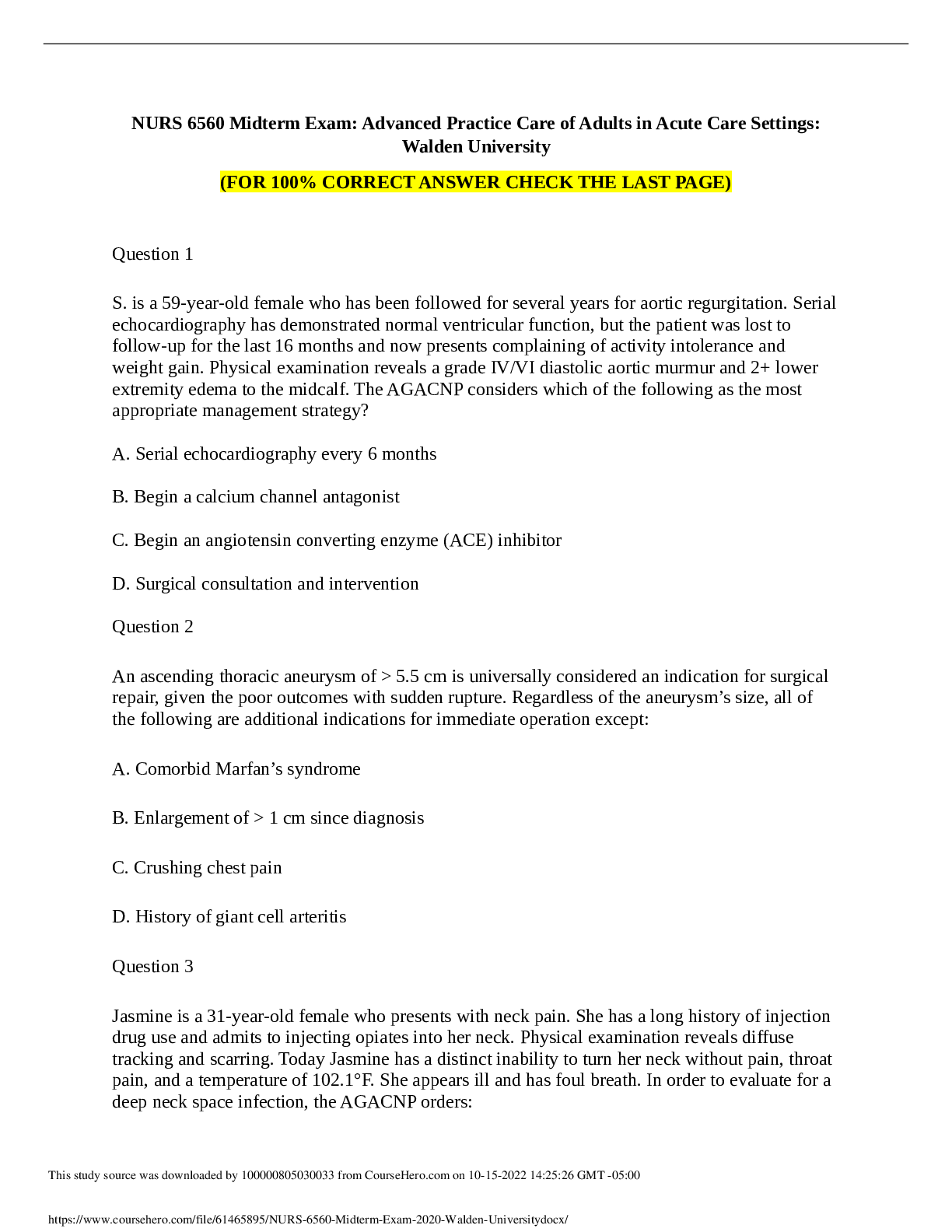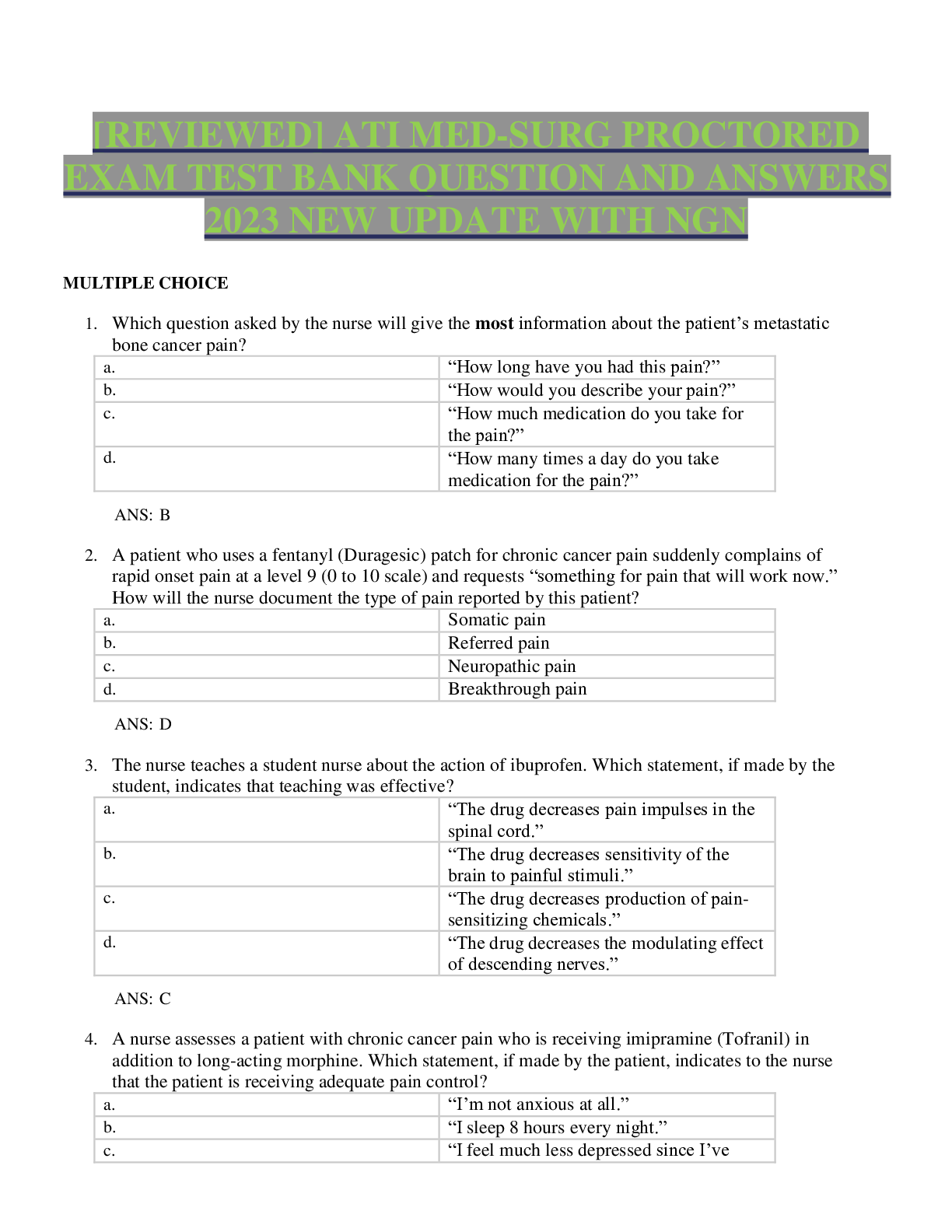healthcare > EXAM PROCTORED > [NGN] ATI NUTRITION PRACTICE A 2024 QUESTION & ANSWERS NEW EDITION 100% SCORES NEW GENERATION (All)
[NGN] ATI NUTRITION PRACTICE A 2024 QUESTION & ANSWERS NEW EDITION 100% SCORES NEW GENERATION
Document Content and Description Below
[NGN] ATI NUTRITION PRACTICE A 2024 QUESTION & ANSWERS NEW EDITION 100% SCORES NEW GENERATION 1. A nurse in an acute care facil- ity is planning care for a client who has chosen to follow Islam- ic d... ietary laws during Ramadan. Which of the following actions should the nurse plan to take? A. place the client on NPO status during nighttime hours B. provide a snack for the client after sunset C. off the client hot tea w/ daytime meals D. allow the client fo eat privately with their family each day at 1300 2. A nurse is cre- ating a plan of care for a client who has mu- cositis following head & neck radiation therapy to treat cancer. Which of the fol- lowing interven- tions should the nurse include in B. provide a snack for the client after sunset (During Ramadan, clients who follow Islamic dietary laws consume meals before dawn and after sunset. The nurse should offer the client a snack or light meal after sunset.) During Ramadan: -clients who follow Islamic dietary laws can eat during nighttime hours. - clients who follow Islamic dietary laws fast during day- time hours. When not fasting, Islamic dietary law specifies that caffeine is prohibited and beverages are consumed after, rather than with, meals. -clients who follow Islamic dietary laws consume meals before dawn and after sunset. C. increased fluid intake to 2 L per day (A client who has mucositis should increase fluid intake to promote hydration and peristalsis. A client who has mucositis should -avoid acidic foods to prevent further irritation. -avoid glycerin-based swabs because they cause dry- ness and irritation. -be provided with room temperature or cooled liquids to reduce irritation. the plan? A. Encourage 3 serving of citrus food daily B. pro- vide lemon-glyc- erin swabs for oral hygiene after meals C. increased fluid intake to 2 L per day D. heat oral hy- giene mouth rins- es before use 3. The nurse is pro- viding discharge teaching to a postpartum client about breast milk use & storage. Which of the following state- ments should the nurse make? A. "refrigerate un- used breast milk immediately after bottle feeding." B. "you can- not place thawed breast mil back in the freezer." C. "you can store expressed breast milk in the freez- er for up to 18 months." B. "you cannot place thawed breast mil back in the freez- er." (The nurse should instruct the client that completely thawed breast milk can be stored in the refrigerator but must be used within 24 hr. Breast milk that has been pre- viously frozen should not be refrozen once it has thawed completely. Thawing creates a possibility for bacterial growth and causes a decrease in antibacterial activity, which destroys antibodies in the milk.) The nurse should instruct the client -that any milk left in a bottle from a feeding should be immediately discarded. -that the recommended duration of time for safely storing expressed breast milk is 6 months. However, it is accept- able for expressed breast milk to be stored for a maximum of 12 months. -to place the container of breast milk in the refrigerator to slowly thaw. If the breast milk is needed sooner, the nurse should instruct the client to place the container of breast milk under warm, running water. Breast milk should not be thawed or warmed in a microwave. This practice can cause burns to the infant's mouth, throat, or upper gastrointestinal tract due to uneven heating, which D. "defrost frozen breast mile on the lowest defrost setting in the mi- crowave." 4. A nurse is car- ing for a client who adheres to a kosher diet. Which fo the following food choices would be appropriate for this client? A. vegetable salad w/ cheese B. lean cuts of pork C. turkey & cheese on rye bread D. shrimp salad & crackers 5. A community health nurse is planning to teach a class about weight manage- ment for cardio- vascular health. Which of the following state- ments should the nurse plan to in- clude? A. "limit your sodium intake to might not be recognized when the client spot checks the milk's temperature. A. vegetable salad w/ cheese (Clients who adhere to a kosher diet can eat dairy products combined with non-meat products at the same meal.) Clients who adhere to a kosher diet -do not eat pork. -do not combine dairy products with meat products at the same meal. -do not eat shellfish. D. "plan to loose weight gradually at 1/2 to 1 pound per week." (The nurse should inform the participants that losing 0.23 to 0.45 kg (0.5 to 1 lb) per week is a healthy and attainable weight-loss goal. Setting realistic goals for weight loss is an important element of success. Trying to lose weight too quickly places clients at risk for nutritional deficiencies and inadequate energy, which can lead to frustration and defeat.) According to the American Heart Association, clients should limit their sodium intake to 1,500 mg/day. Evi- dence-based practice indicates that the most significant decreases in blood pressure are seen in clients who have a daily sodium intake of 1,500 mg or less. 1,800 mg per day." The nurse should inform the participants that B. "reduce your daily intake or food that contain protein." C. "taking a daily multivitamin will prevent car- diovascular dis- ease." D. "plan to loose weight gradually at 1/2 to 1 pound per week." 6. A client is expe- riencing anorex- ia related to cancer treatment. Which of the fol- lowing interven- tions should the nurse implement to increase the client's nutritional intake? A. recommend cooking aromatic foods to stimulate appetite. B. serve hot food rather than cold foods. C. instruct the client to eat 3 meals per day D. add extra calo- ries & protein in every meal -plant-based protein assists in lowering cholesterol lev- els, which ultimately reduces the workload of the heart. Adequate protein is also important for maintaining muscle mass, which aids in weight management. -if a nutritionally-balanced diet is carefully planned and followed, vitamin supplements are not necessary. Evi- dence-based practice indicates that multivitamin supple- ments do not decrease or prevent cardiovascular dis- ease. D. add extra calories & protein in every meal (AD. add extra calories & protein in every meal) -Cancer treatments can cause an increased sensitivity to odors, precipitating nausea and increasing anorexia. The nurse should -serve cold foods rather than hot foods. Hot foods emit odors that can further decrease the client's appetite. -advise the client to eat small, frequent meals approxi- mately every 2 hr. [Show More]
Last updated: 5 months ago
Preview 1 out of 37 pages
Instant download

Buy this document to get the full access instantly
Instant Download Access after purchase
Add to cartInstant download
Reviews( 0 )
Document information
Connected school, study & course
About the document
Uploaded On
Jan 19, 2024
Number of pages
37
Written in
Additional information
This document has been written for:
Uploaded
Jan 19, 2024
Downloads
0
Views
16





